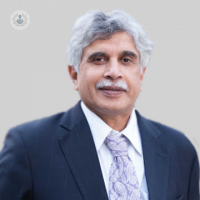Mitral valve surgery: the best option for patients with severe mitral regurgitation
Written in association with:There are four valves in the heart and their function is to ensure that blood flow is performed in the right direction and in the right way. Valves can be affected because they are not able to open well (stenosis) or because they cannot be closed properly (insufficiency). At present, in western countries and with the progressive aging of their population, the most frequent pathologies are stenosis of the aortic valve that requires valvular substitution, and mitral insufficiency of degenerative origin that affects 6.4% of people between 65 and 74 years old and 9.3% of people over 75 years of age.
In his latest online article, renowned consultant cardiothoracic surgeon Mr Shyamsunder Kolvekar explains the condition and treatment in detail.

Why do patients with severe mitral regurgitation need surgery?
When the mitral valve is unable to close properly, a large part of the volume of blood ejected from the heart in each heartbeat is directed backwards, congesting the lungs and exerting a volume overload on the heart itself. The heart, in its attempt to adapt, is going to become large (dilatation) and will lose force of contraction. The patient will feel more fatigued, find it difficult to breathe and may have complications such as arrhythmias or embolisms. It is very important to restore normal valve function before repercussion on the heart is significant.
Is it better to repair the valve than to replace it with an artificial prosthesis?
Until a few years ago, all patients with severe mitral valve failure who underwent mitral valve surgery had the affected heart valve replaced with an artificial prosthesis. Today it is known that the best option is not to replace but to preserve and repair the patient's own valve. The advantages are significant:
- The architecture and function of the heart is better preserved
- The patient often does not need to take anticoagulants for life.
- Better and faster recovery.
- The risk of complications is reduced
The advantages are so important that, at present, early surgery (even before symptoms manifest) is recommended for all patients with severe mitral regurgitation. We can ensure an effective repair in more than 95% of cases and a lower surgical risk of 1%.
Can all mitral valves with insufficiency be repaired?
The mitral valve is a very complex structure, with many anatomical elements that must interact with each other in a coordinated way to achieve a perfect closure of the valve. The components of the mitral valve are: the mitral annulus, two veins (anterior and posterior), multiple tendinous cords, papillary muscles and the wall of the left ventricle.
In degenerative valve disease, which is the most frequent, we always find an excess in the mobility of the valves during cardiac contraction (prolapse) and dilation of the mitral annulus. Tissue involvement may be slight (fibro-elastic deficiency) or affect many parts of the valve (Barlow's disease). Our main objective will be to restore the closure capacity of this mitral valve (coaptation) by normalising the mobility of the veils and remodelling the mitral annular shape. It is essential to fully and individually evaluate each patient with mitral disease to have an accurate idea of the reasons why the valve fails.
At present, echocardiography studies provide all the necessary information and are able to predict the reparability of the valve. The patient should be referred to surgeons with sufficient training, experience and ability to repair complex mitral valve abnormalities and perform this operation on a regular basis (more than 50 mitral repairs per year).
Mr Shyamsunder Kolvekar is a leading consultant cardiothoracic surgeon based in London. If you would like to book a consultation with Mr Kolvekar, you can do so today via his Top Doctors profile.


